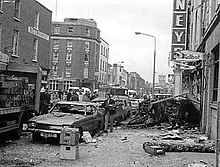Barron Report
| Dublin and Monaghan bombings | |
|---|---|
| Part of the Troubles | |

Some of the damage caused by the second car bomb on Talbot Street, Dublin
|
|
| Location | Dublin and Monaghan, Ireland |
| Date | 17 May 1974 5.28 pm, 5.30 pm, 5.32 pm; 6.58 pm |
|
Attack type
|
4 car bombs |
| Deaths | 34 (27 in Dublin, 7 in Monaghan) |
|
Non-fatal injuries
|
About 300 |
| Perpetrators | Ulster Volunteer Force |
The Dublin and Monaghan bombings of 17 May 1974 were a series of co-ordinated bombings in Dublin and Monaghan, Ireland. Three bombs exploded in Dublin during rush hour and a fourth exploded in Monaghan almost ninety minutes later. They killed 33 civilians and a full-term unborn child, and injured almost 300. The bombings were the deadliest attack of the conflict known as the Troubles, and the deadliest attack in the Republic's history. Most of the victims were young women, although the ages of the dead ranged from five months to 80 years.
The Ulster Volunteer Force (UVF), a loyalist paramilitary group from Northern Ireland, claimed responsibility for the bombings in 1993. It had launched a number of attacks in the Republic since 1969. There are allegations taken seriously by inquiries that elements of the British state security forces helped the UVF carry out the bombings, including members of the Glenanne gang. Some of these allegations have come from former members of the security forces. The Irish parliament's Joint Committee on Justice called the attacks an act of international terrorism involving British state forces. The month before the bombings, the British government had lifted the UVF's status as a proscribed organisation.
The bombings happened during the Ulster Workers' Council strike. This was a general strike called by hardline loyalists and unionists in Northern Ireland who opposed the Sunningdale Agreement. Specifically, they opposed the sharing of political power with Irish nationalists, and the proposed role for the Republic in the governance of Northern Ireland. The Republic's government had helped bring about the Agreement. The strike brought down the Agreement and the Northern Ireland Assembly on 28 May.
...
Wikipedia
